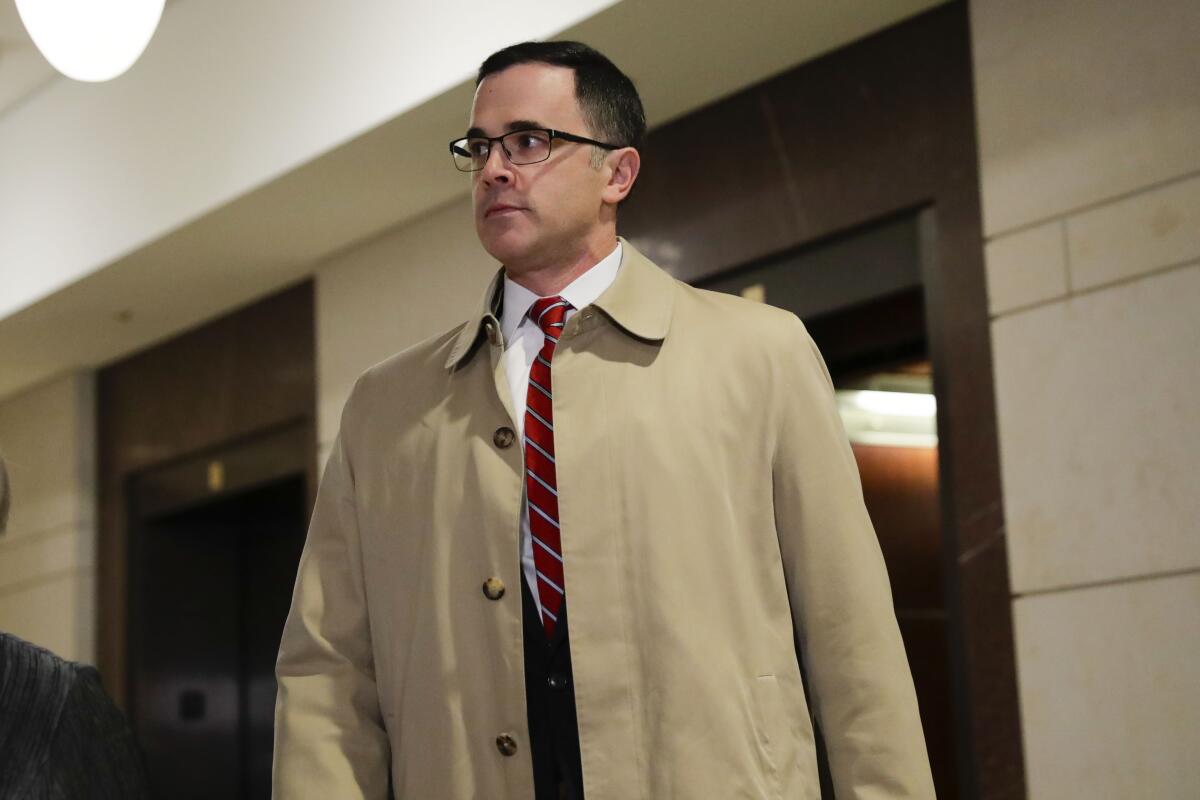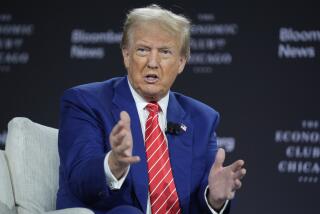Second National Security Council official says he voiced concerns about Trump’s call with Ukrainian leader

WASHINGTON — A second senior White House aide told House investigators Thursday that he immediately expressed concerns to National Security Council lawyers after a phone call in which President Trump pressed Ukraine to investigate his political rivals, a conversation at the heart of the impeachment investigation.
But the aide also told lawmakers that he did not believe anything illegal was discussed on the call.
Tim Morrison, who testified behind closed doors a day after he announced plans to resign as Trump’s top advisor for Russian and European affairs, was the second official to say he went to authorities after he heard Trump ask Ukraine’s president, Volodymyr Zelensky, for a “favor” during the controversial July 25 phone call.
A former Republican staffer on Capitol Hill and the first White House political appointee to appear, Morrison largely echoed the testimony of Lt. Col. Alexander S. Vindman, another White House expert on Ukraine, who told the panel on Tuesday that he was so alarmed after the call that he went to the National Security Council’s lead counsel to complain.
Morrison said the White House memorandum of the call, which was released in September, was accurate and that he had three concerns about the document becoming public.
“First, how it would play out in Washington’s polarized environment; second, how a leak would affect the bipartisan support our Ukrainian partners currently experience in Congress; and third, how it would affect the Ukrainian perceptions of the U.S.-Ukraine relationship,” he said in his opening statement.
“I want to be clear, I was not concerned that anything illegal was discussed,” he added.
Morrison’s testimony has been widely anticipated since August, when a CIA officer assigned to the White House filed an anonymous whistleblower complaint that said multiple officials at the White House had said Trump was “using the power of his office to solicit interference from a foreign country in the 2020 U.S. election.”
Morrison’s name also appeared more than a dozen times in testimony last week by William B. Taylor Jr., the acting U.S. ambassador to Ukraine, that appeared to contradict Trump’s repeated denials of using foreign policy for personal gain.
Taylor told impeachment investigators that Trump had frozen nearly $400 million in congressionally approved military aid to Kyiv unless Zelensky publicly promised to investigate Trump’s political rival Joe Biden and his son Hunter. He said Trump also was holding up a long-promised meeting with Zelensky until the Ukrainian leader agreed.
Taylor said Morrison had also expressed concerns about a July 10 meeting between Gordon Sondland, the U.S. ambassador to the European Union, and Andriy Yermak, a top aide to Zelensky. Taylor said that Sondland had told Yermak that the military aid would not be released until Zelensky committed to investigate Burisma, a Ukrainian gas company that once employed Biden’s son.
“I was alarmed by what Mr. Morrison told me about the Sondland-Yermak conversation,” Taylor testified. “This was the first time I had heard that the security assistance — not just the White House meeting — was conditioned on the investigations.”
In his statement Thursday, Morrison confirmed Taylor’s account with one small difference: He said he remembered Sondland saying that Ukraine’s prosecutor general, not Zelensky, could open the inquiry.
At least in his opening statement, Morrison did not indicate the president was involved. Like Taylor, Morrison appeared to place responsibility for the administration’s “shadow foreign policy” toward Ukraine, as others have called it, on Sondland and Trump’s personal lawyer, Rudolph W. Giuliani.
Morrison said he and Taylor “had no reason to believe” that release of the frozen military aid was conditioned on a public statement reopening the Burisma investigation until he had a conversation with Sondland on Sept. 1.
“Even then I hoped that Ambassador Sondland’s strategy was exclusively his own and would not be considered by leaders in the administration and Congress, who understood the strategic importance of Ukraine to our national security,” he said.
Morrison indicated that he hoped other national security officials “could convince President Trump to release the aid” because Zelensky and the country’s reform-oriented parliament, called the Rada, “were genuinely invested in their anti-corruption agenda.”
“My regret is that Ukraine ever learned of this review and that, with this impeachment inquiry, Ukraine has become subsumed in the U.S. political process,” he added.
Known as a hawk in foreign policy circles, Morrison said Wednesday he would step down from his National Security Council post. He said Thursday that he had not yet submitted a formal resignation because he didn’t want his testimony and resignation to appear to be tied together.
Morrison was brought into the White House in July 2018 by national security advisor John Bolton to work on arms controls issues, but later shifted to the portfolio that focuses on Russia and Europe.
Bolton stepped down in September after clashing with Trump over the president’s policies on North Korea, Syria and other issues. House impeachment investigators have asked him to testify on Nov. 7, but it’s unclear whether Bolton will comply without a subpoena.
House investigators are expected to take closed-door depositions through next week from several other national security and administration officials. A House vote Thursday approved the start of public hearings, possibly as soon as the week of Nov. 11.
Republican lawmakers will be hard-pressed to dismiss Morrison. Over the last two decades, Morrison has worked for Rep. Mark Kennedy (R-Minn.) and Sen. Jon Kyl, (R-Ariz.), and as a senior GOP staffer on the House Armed Services Committee, including for nearly four years when it was chaired by Rep. Mac Thornberry (R-Texas).
The Associated Press contributed to this report.
More to Read
Get the L.A. Times Politics newsletter
Deeply reported insights into legislation, politics and policy from Sacramento, Washington and beyond. In your inbox three times per week.
You may occasionally receive promotional content from the Los Angeles Times.












